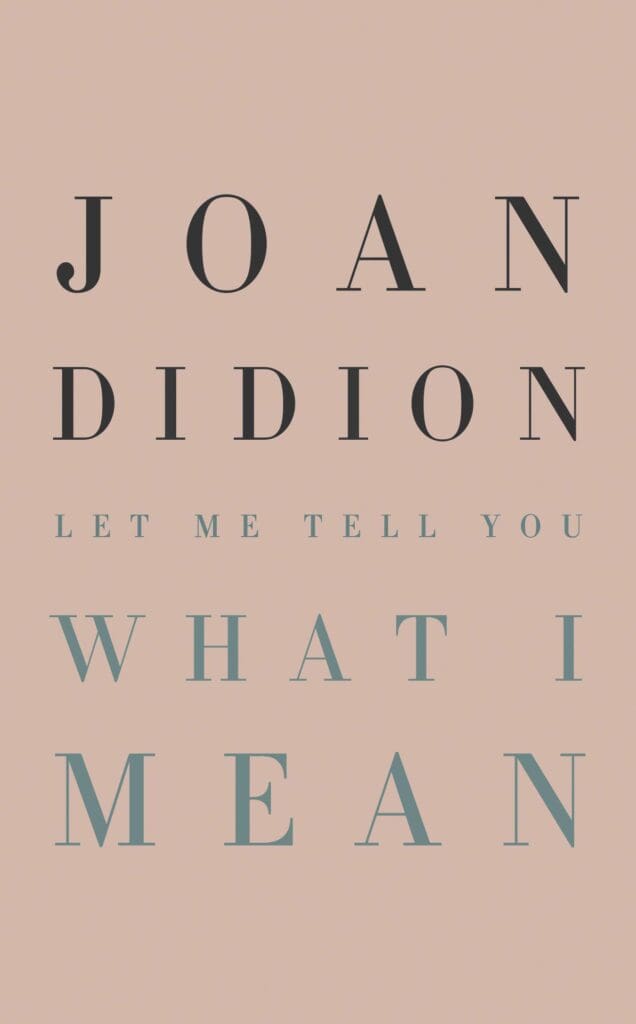In times of crisis, we often look to the voice that is calm, rational, not prone to high emotion; perhaps it’s fortuitous, then, that a year into the global pandemic we’re receiving a new book from Joan Didion, one of our most controlled stylists—a writer known for her careful, neutral tone, and one who can observe an incident and report her findings with a precision that often belies the extremities of her subject matter. It’s right there in the title of this latest collection: Let Me Tell You What I Mean (149 pages; Knopf)—would readers really expect Didion to do any less?
Granted, calling this a “new” book may be somewhat misleading, as it serves as more of an “odds and ends” release, compiling a series of never-before-collected short essays written between 1968 and 2000; one might think of this as a B-Side album, if you will. But Didion is one of our few living writers who can truthfully be said to have achieved iconic status, one who counts both casual readers and esteemed authors among her devoted audience, and even her “B-Sides” ring with the authority of her distinctive voice. Whether she’s touring the grounds of San Simeon, the palatial estate of Citizen Kane-inspiration William Randolph Hearst, in “A Trip to Xanadu” (“Make a place available to the eyes, and in certain ways it is no longer available to the imagination”), or visiting a Gamblers Anonymous meeting in the late Sixties (“I had not heard so many revelations of a certain kind since I used to fall into conversations on Greyhound buses under the misapprehension that it was a good way to learn about life”), no one reports on the findings of her reality quite like Didion.
And the essays gathered here may be of particular interest to Didion’s fellow writers as so many of them touch on the act of writing itself, including “Why I Write,” in which Didion details her philosophy on the craft, which expectantly pulls no punches: “…there’s no getting around the fact that setting words on paper is the tactic of a secret bully, an invasion, an imposition of the writer’s sensibility on the reader’s most private space.” She continues: “I write entirely to find out what I’m thinking, what I’m looking at, what I see and what it means. What I want and what I fear.”
A later piece, “Telling Stories,” tackles the subject with a much lighter tone; in case readers have been wondering why Didion never tried her hand at the short story, Didion helpfully provides an answer by listing the numerous publications that rejected her early attempts at the form, including the New Yorker and Paris Review. (Yes, emerging writers can take heart; even an icon like Didion collected her fair share of rejection letters at the outset of her career). On a more universal note is the delightful “On Being Unchosen by the College of One’s Choice,” which details Didion’s crushing disappointment at being rejected by Stanford University, and leads to this hilarious anecdote: “I spent the rest of the spring in sullen but mild rebellion, sitting around drive-ins, listening to Tulsa evangelists on the car radio, and in the summer I fell in love with someone who wanted to be a golf pro, and I spent a lot of time watching him practice putting…”
The risk of any such collection is creating the impression of a mere grab bag, a jostled array of works in contrast with the carefully curated selections of Didion’s famous titles like Slouching Towards Bethlehem and The White Album; it’s an impression that somewhat bears out here, as amid pieces like “Last Words,” wherein Didion shares her appreciation for Ernest Hemingway’s prose style, there remain outliers such as “Everywoman.com,” an essay in which Didion waxes philosophical about…Martha Stewart’s brand circa 2000. Even so, Didion’s insight means this essay serves as a window into the sexist attitudes and latent misogyny Martha Stewart likely encountered as she turned herself into one of the most powerful businesswomen in America: “The dreams and the fears into which Martha Stewart taps are not of ‘feminine’ domesticity but of female power, of the woman who sits down at the table with the men and, still in her apron, walks away with the chips.”
As is always the case with Didion, no words are wasted—and we are fortunate to have more of her essays to savor in this uncertain time. At first glance, the assortment gathered here may appear to lack cohesion, but the unifying force is, as ever, Didion’s voice—its incisiveness, its understated humor, her pragmatic view. The author can release a book called Let Me Tell You What I Mean in part because, for so many readers, we sense Didion tells things precisely as they are.

